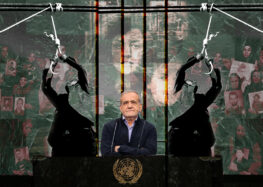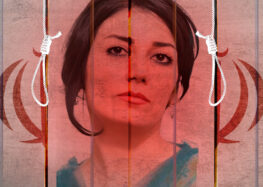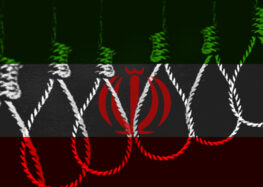Iran Locking Up Its Labor Activists as Worker Demands Grow
 Growing Number of Activists Behind Bars for Asking for Their Rights
Growing Number of Activists Behind Bars for Asking for Their Rights
Islamic Republic in Severe Violation of Its ILO Obligations
July 17, 2024 – The recent death sentence against female labor activist Sharifeh Mohammadi highlights the dire situation faced by Iran’s labor activists, who increasingly find themselves in the crosshairs of the Islamic Republic’s repressive apparatus for calling for their rights.
Bent on crushing a vocal labor movement, the Iranian authorities are manufacturing serious national security charges against a growing number of these activists in order to sentence them to lengthy prison terms in an escalating campaign of repression over the last few months, according to research by the Center for Human Rights in Iran (CHRI).
Key Findings:
- Dozens of labor activists have been summoned, arrested, banned from leaving the country, imprisoned, and denied medical care behind bars just in the last few months.
- Most seriously, a labor activist and mother of a young son was recently sentenced to death for her peaceful activism.
- Workers are imprisoned for peacefully demanding fair wages and safe working conditions.
“Workers in Iran are being thrown in prison for years simply for asking for a livable wage or a safe workplace,” said Hadi Ghaemi, executive director of CHRI. “The international community must speak out on their behalf and against this grotesque and unlawful abuse of power in Iran, in which no dissent is tolerated.”
CHRI calls upon:
- The UN to forcefully condemn these abuses and demand that the Iranian authorities immediately release these imprisoned activists and annul the death sentence.
- Governments worldwide to warn their Iranian counterparts of escalating diplomatic and economic isolation if these abuses continue.
- The International Labor Organization (ILO) to communicate to the Iranian authorities its grave concern over Iran’s violations of the ILO’s Fundamental Principles, and to issue a public statement of concern if these violations continue.
- Trade unions worldwide to publicly express solidarity with Iranian workers who are behind bars for actions that other workers around the world can take without risk.
The case of Sharifeh Mohammadi illustrates this intensifying repression. Sentenced to death by Branch 1 of Iran’s Islamic Revolutionary Court in Rasht, she was charged with “armed rebellion” due to alleged ties to a national labor union and an ethnic rights organization—a charge that could result in the death penalty. She has vehemently denied membership in either group.
Manufactured national security charges, which also include “propaganda against the state,” “disturbing public opinion,” and forming independent unions “against national security,” are routinely used by the Iranian judiciary against peaceful activists and labor leaders in order to justify harsh sentences.
Between March 21, 2024, the beginning of the Iranian New Year, and July 1, 2024, dozens of labor rights activists have been targeted by state intelligence agencies for their peaceful activism, resulting in job termination, summons to court, arrests, mistreatment during detention, bans on leaving the country, and imprisonment or re-incarceration after brief furloughs, in order to prevent them from organizing or voicing their demands publicly. Once in prison, they are frequently denied critical medical care.
The Islamic Republic’s actions are in severe violation of its obligations under the International Labor Organization’s (ILO) Fundamental Principles, to which Iran is a signatory, as well as the International Covenant on Civil and Political Rights (ICCPR) and the International Covenant on Economic, Social and Cultural Rights (ICESCR), all of which require respect for the right to peacefully protest, to strike, and to independently bargain collectively.
Workers Asking for Fair Wages, Safe Working Conditions
Labor’s demands in Iran have long centered on addressing serious and systematic abuses of workers’ rights, including:
- Firing strikers and imprisoning labor leaders
- Unlivable wages, especially given the country’s 45% annual inflation rate
- Frequent practice of unpaid work and inability to collect back wages
- Unsafe working conditions (Iran has an extraordinarily high work fatality rate)
- Refusal to provide full guaranteed benefits such as pensions
- Use of temporary contracts and other tactics to undermine workers’ rights
During just this March-July 2024 period, workers have held major rallies in at least 14 cities across Iran, according to CHRI’s research, seeking unpaid or livable wages.
Notably, between June 19 and July 1, 2024, project and contract workers in Iran’s critical hydrocarbon sector held strikes in more than 115 oil and gas companies operating in cities including Andimeshk, Kashan, Shiraz, Dehloran, Aran, Bidgol, and Haftjan.
To date, more than 9,000 project and contract workers have joined an unofficial national strike campaign aimed at improving their income, gaining job security by eliminating contractors, and obtaining safer working conditions.
Labor Activist Arrests and Detainments Since March 2024
Below is a chronological list of cases during this March-July 2024 period in which the Iranian judiciary has unlawfully prosecuted peaceful labor activists and subjected them to abuse in state custody.
- (March 25, 2024) Majid Rezaei, a labor activist, was returned to Evin Prison after completing a two-week furlough. He was arrested at his home in Tehran on July 15, 2023, and later transferred to the Greater Tehran Central Penitentiary (GTCP) and then to Evin Prison. Rezaei was sentenced to one year in prison by Branch 26 of Iran’s Islamic Revolutionary Court in Tehran for “propaganda against the state” and ordered to perform four hours of daily community service for three months and attend eight hours of “emotional and psychological counseling” at a psychiatric institute. Iranian judges increasingly detain peaceful activists in psychiatric hospitals without medical cause as an additional punishment to suppress their activism.
- (March 29, 2024) Kamyar Fakour, a labor activist, was returned to Evin Prison after three months on furlough. He was arrested along with his wife, Sarvenaz Ahmadi, a journalist and social worker, on November 6, 2023, and charged with “propaganda against the state” and “assembly and collusion against national security.”
- (May 1, 2024) Ramin Karimi, a labor activist, was summoned to the Ministry of Intelligence office in Sanandaj, Kurdistan province, interrogated, and warned not to participate in any rallies. Karimi has previously been interrogated by intelligence agents for his activities.
- (June 18, 2024) Reyhaneh Ansarinejad, a labor activist suffering from rheumatoid arthritis, was transferred from Evin Prison to a hospital in Tehran in extremely poor health. Ansarinejad, a member of the LUACC, was arrested on May 12, 2022, and held in solitary confinement in Ward 209 for nearly three months. She was pressured to extract confessions and released on August 6, 2022, on bail set at 15 billion Iranian rials ($24,590 USD). Rearrested on April 28, 2023, along with other activists, she was released on bail 10 days later. Tried in Branch 15 of the Islamic Revolutionary Court in Tehran on July 17, 2024, Ansarinejad was sentenced to four years in prison and a two-year ban on leaving the country, membership in political parties, and online activities.
- (June 18, 2024) Davoud Razavi, a board member of the Union of Workers of the Tehran and Suburbs Bus Company (UWTSBC), was sent from Evin Prison to a hospital after authorities prevented him from receiving specialized treatment for serious medical issues. Razavi’s gastrointestinal problems required continuous treatment, but he was repeatedly denied medical care, a source with detailed knowledge of his case told an Iranian rights group.
- (June 22, 2024) Labor activists Mohammad Irannejad, Nasrollah Amirlou, and Morteza Saeidi were sentenced to two years in prison by Iran’s Islamic Revolutionary Court in Shahriar, Tehran province, for “forming a so-called labor union with the intention of disrupting national security.”
- (June 22, 2024) Maziar Seyednejad, a labor activist, was returned to Evin Prison in Tehran after his furlough ended. He was sentenced to three years in prison by Branch 15 of Iran’s Islamic Revolutionary Court in Tehran for “membership in communist groups” and “propaganda against the state.”
- (June 25, 2024) Reza Shahabi, a board member of the Syndicate of Workers of Tehran and Suburbs Bus Company (SWTSBC), was sent from Evin Prison to the hospital for ultrasound and blood tests. Shahabi’s spinal discs are in poor condition, requiring urgent surgery, according to a neurosurgeon. Shahabi went on a hunger strike on July 8, 2024, to protest the lack of medical care in Evin Prison.
- (June 29, 2024) Esmail Gerami, a labor activist, was summoned to Branch 1027 of the Criminal Court in Tehran to appear on July 6 to defend himself against charges of “disturbing public peace and order” for organizing rallies by state retirees.
- (June 29, 2024) Atefeh Rangriz, a labor and women’s rights activist, was arrested and taken to prison in Shahrood, Semnan province. She was charged with “forming a group with the intention of disrupting national security,” “propaganda against the state,” and “publishing falsehoods online with the intention of disturbing public opinion,” and ultimately sentenced to two years and seven months in prison for “collaboration and membership in anti-state groups” and “propaganda against the state.” Rangriz went on a hunger strike on June 29, 2024.
- (June 30, 2024) Farhad Sheikhi, a labor activist, was sentenced to one year in prison and a two-year ban on leaving the country and living in Alborz and Tehran provinces. The verdict was issued by Branch 1 of Iran’s Islamic Revolutionary Court in Karaj, Alborz province, presided over by Judge Mousa Asef al-Hossaini. Sheikhi was found guilty of “propaganda against the state.” He was arrested by security agents on May 27, 2024, at his home in Hashtgerd, Alborz province, and transferred to Rajaee-Shahr Prison in Karaj, a source with detailed knowledge of the case told CHRI. He was released on June 12 after being charged in the Hashtgerd courthouse, with bail set at 1 billion Iranian rials (approximately $1,639). Sheikhi had been previously arrested and convicted for his peaceful labor rights activities and was last released from prison on February 7, 2023, following a general prisoner amnesty.
Other Notable Cases:
- Osman Esmaili, a labor activist imprisoned in Saqqez, Kurdistan province, was sent on medical furlough on May 25, 2024, after posting bail. Despite serious health problems, Esmaili had repeatedly been denied medical treatment since his arrest.
- Nasrin (Azam) Khezri Javadi, a founding member of the Retired Social Security Workers Council, is suffering from several health issues in Evin Prison. Diagnosed as too ill for incarceration, she has been serving a five-year sentence since July 1, 2022, on multiple charges and was sentenced to 74 lashes. Javadi was arrested at an International Labor Day rally on May 1, 2019, and released eight days later on bail set at 1 billion Iranian rials ($1,639 USD).
This report was made possible from donations by readers like you. Help us continue our mission by making a tax-deductible donation.






